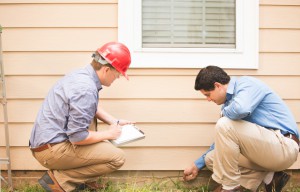When it comes time to drawing on your portfolio’s hard-won equity for re-investment, there’s no escaping the valuation process.
 While there are a number of professionals who can give you a reasonable idea of what your holding is worth, the one that counts most is the registered property valuer, because banks rely on their opinion before approving your loan.
While there are a number of professionals who can give you a reasonable idea of what your holding is worth, the one that counts most is the registered property valuer, because banks rely on their opinion before approving your loan.
Valuers have always been around, but what they actually do and the elements they look for in a home remain somewhat of a mystery to the average property investor.
And that’s why understanding their process can help you add much-needed dollars to your worth.
So, how do property valuers assess a property’s value?
It’s a process
Property valuers hold professional qualifications and are registered with State authorities to conduct assessments that can be relied on by their clients.
They will also be affiliated with a professional body such as the Australian Property Institute or the international body, the Royal Institute of Chartered Surveyors.
All this is to say they are legally liable for the service they provide and must prove their opinion stands up to the scrutiny of a courtroom.
 Valuers will therefore follow strict processes and guidelines to ensure they’re on the money.
Valuers will therefore follow strict processes and guidelines to ensure they’re on the money.
The key is the definition of market value space which case law defines as:
The estimated amount for which an asset or liability should exchange on the valuation date between a willing buyer and a willing seller in an arm’s length transaction, after proper marketing and where the parties had each acted knowledgeably, prudently and without compulsion.
There are arguable points within this definition, but basically, the valuer is assessing what your home should sell for in its “as is” condition at a specific date and time if it had been openly and fairly marketed.
Knowing this shows why valuers won’t predict future property value movements based on musings about market direction or what renovations and improvements you hope to carry out.
It’s a “here and now” event in their eyes.
1. The inspection
A property is typically inspected and viewed by a valuer as three interrelated elements.
Land – Location, position, aspect, size, dimension and topography are all considered by the valuer. 
They are looking for all the pros and cons across these, and other, components.
Dwelling – Age, size, construction, layout, accommodation, condition, utility. Again, the valuer is wandering through your home and taking in what a typical buyer would consider a plus, and a minus.
Ancillary (or site) improvements – Fencing, landscaping, driveway, pool, shed, pathways, tennis courts and any other extra constructions separate from the dwelling.
A valuer will progressively work through these three elements of your holding, taking note by sight and use of measurements to complete a comprehensive and descriptive picture of your holding.
They will also rely on data from various other sources around town planning and location.
2. The sales evidence
The basic, primary method of assessment is called the Market Approach and it simply relies on comparing your property to other properties that have sold in your area recently.
By use of databases, listing portals and their local agent contacts, a valuer will gather three-to-six property sales that are nearby, recent and similar to your home and research the attributes of those properties. 
The valuer’s skill through their experience, art and science is in determining by how much in dollar terms your property is better or worse than the comparables.
The house next door sold last week for $700,000, but is smaller, older and doesn’t have a pool?
Yours is worth a certain amount more than that.
An identical house across the road sold for $825,000 but on a bigger block with better views?
Yours is worth less.
This progressive comparison across a collection of reasonable sales soon provides a tight range of value that gives a fair indication of what you should achieve.
There are other approaches to this valuation that help double check the figure, but using comparable sales is considered the preeminent approach.
3. The report
With all this information collated, the valuer will now send a report to the banks. 
It’s important to realise that along with the figure, the valuer will be asked to comment on any risks associated with the property itself or the market it’s in.
For example, if high tension power lines traverse your lot, they will rate a mention.
If you’re in a single industry town and things are looking a bit dire for the major employer, expect that to be part of the report.
In some instances, risk ratings can have as much impact as the figure when it comes to whether or not you’re approved for a loan.
Valuations are key to building a portfolio but getting the best result possible depends on your understanding of the valuation process and identifying ways to improve your outcome.
Now is the time to take action and set yourself for the opportunities that will present themselves as the market moves on
If you’re wondering what will happen to property in 2020–2021 you are not alone.
You can trust the team at Metropole to provide you with direction, guidance and results.
In challenging times like we are currently experiencing you need an advisor who takes a holistic approach to your wealth creation and that’s what you exactly what you get from the multi award winning team at Metropole.
If you’re looking at buying your next home or investment property here’s 4 ways we can help you:
Strategic property advice. – Allow us to build a Strategic Property Plan for you and your family. Planning is bringing the future into the present so you can do something about it now! This will give you direction, results and more certainty. Click here to learn more 
Buyer’s agency – As Australia’s most trusted buyers’ agents we’ve been involved in over $3Billion worth of transactions creating wealth for our clients and we can do the same for you. Our on the ground teams in Melbourne, Sydney and Brisbane bring you years of experience and perspective – that’s something money just can’t buy. We’ll help you find your next home or an investment grade property. Click here to learn how we can help you.
Wealth Advisory – We can provide you with strategic tailored financial planning and wealth advice. Click here to learn more about we can help you.
Property Management – Our stress free property management services help you maximise your property returns. Click here to find out why our clients enjoy a vacancy rate considerably below the market average, our tenants stay an average of 3 years and our properties lease 10 days faster than the market average.
NOW READ:
5 things property investors need to know about valuations
10 ways to a better valuation
Expert tips to help you best maximise the valuation of your property
Read more: propertyupdate.com.au


